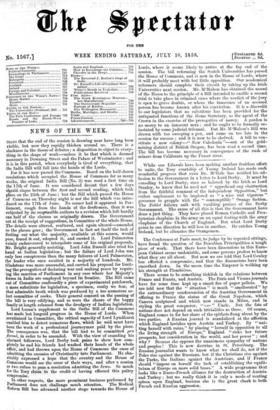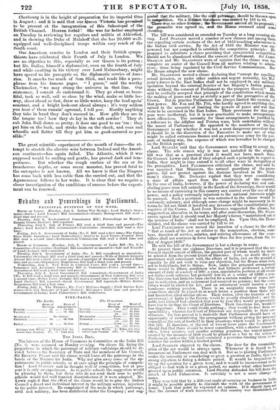NEWS OF THE WEEK.
SIGNS that the end of the session is drawing near have long been visible, but now they rapidly thicken around us. There is a
slackness in the tissue of debates ; a disposition to object to every- thing in the shape of work—unless it be that which is deemed necessary in Downing Street and the Palace of Westminster ; and it is in this period, when everybody is tired of everything, that the India Bill will fall into the hands of the Lords.
For it has now passed the Commons. Based on the half-dozen resolutions which occupied the House of Commons for so many weeks, the original India Bill (No. 3) was read a first time on the 17th of June. It was considered decent that a few days skauld elapse between the first and second reading, which took plaee on the 25th of June ; but the Bill which passed the House of Commons on Thursday night is not the Bill which was intro- duced on the 17th of June. No sooner had it appeared in Par- liament, rough from the hands of the draftsman; than it was subjected by its responsible authors to a revision which left hardly one half of the clauses as originally drawn. The Government sat at the receipt of suggestions, in Committee of the whole House.
The details were altered, realtered, and again altered—amended as the phrase goes ; the Government in fact set itself the task of finding out what the majority, available at this season, would pass, found it out, adopted it, and carried it. Lord Palmerston vainly endeavoured to interpolate some of his original proposals, Mr. Bright generally assisting. Lord John Russell also tried his hand. at Indian legislation ; but the failure of Lord John was only less conspicuous than the many failures of Lord Palmerston, the leader who once exulted in a majority of hundreds. Mr.
Gladstone was more successful, and carried his proposal for limit- kg' the prerogative of declaring war and making peace by requir- ing the sanction of Parliament in any case where her Majesty's forces in India are employed beyond its frontier. The Bill came out of Committee confessedly a piece of experimental patchwork, a mere substitute for legislation, a specimen, costly we fear, of that admirable broth which was produced by a too numerous se- lect committee of cooks. Their general concord on the passing of the bill is very edifying, and so were the cheers of the happy family at length released from the drudgery of Indian legislation. Lord Lucan's supplement to the Oaths Bill of the Commons has made but languid progress hi the House of Lords. When scrutinized in Committee, the critical sagacity of Lord Lyndhurst enabled him to detect numerous flaws, which he said must have been the work of a professional journeyman paid by the piece.
The consequence was, that the bill had to be committed pro forma, in order to be amended. With the view of consoling his alarmed followers, Lord Derby took pains to show how com-
pletely he and his friends had washed their hands of the whole affair, and had thrown upon the House of Commons the onus of admitting the enemies of Christianity into Parliament. He cha- ritably expressed a hope that the country and the House of Commons would see the error of their ways, and after a session or two refuse to pass a resolution admitting the Jews. So much for the Tory claim to the credit of having effected this paltry compromise.
In other respects, the more prominent business performed by Parliament does not challenge much attention. The Medical Reform Bill has advanced another stage towards the House of
Lords, where it seems likely to arrive at the fag end of the session. The bill reforming the Scotch Universities has passed the House of Commons, and is now in the House of Lords, where it will probably meet with but little opposition. Our academical reformers should complete their circuit by taking up the Irish Universities next session, Mr. M‘Mahon has obtained the assent of the House to the principle of a Bill intended to enable a second trial to take place in criminal cases where the verdict of the jury is open to grave doubts, or where the innocence of an accused person has become known after his conviction. It is a discredit to our legislators that no substitute has been provided for the antiquated functions of the Home Secretary, as the agent of the Crown in the exercise of the prerogative of mercy. A pardon is no mercy to an innocent man ; and he ought to be formally re- instated by some judicial tribunal. But Mr. M'Mahon's Bill was drawn with too sweeping a pen, and came on too late in the session for success ; and it is now to be shelved. A bill to con- stitute a new colony—" New Caledonia "—out of the gold- mining district of British Oregon, has been read a second time. The bill has become necessary in consequence of the rush of miners from California up the Fraser river.
While our Liberals have been making another fruitless effort to unite, the Tory courtship of Young Ireland has made such wonderful progress that even Dr. M'Hale has notified his ad- hesion to the Government in a letter to Lord Derby. It must be consoling to Lord Derby, once so beloved by the Irish as Lord Stanley, to know that he need not " apprehend any obsttuction from the faithful remnant of the independent Opposition," but rather unpleasant to be implored as " a wise and vigorous " governor to grapple with the " contemptible " Orange faction. The Tablet follows suit with exulting praises of the Derby Government. The cause of all this is that the Government have done a just thing. They have placed Roman Catholic and Pres- byterian chaplains in the army on an equal footing with, the army chaplains of the Church of England. But what Lord Derby gains in one direction he will lose in another. He catches Young Ireland, but he alienates the Orangemen.
The Conference at Paris must, to judge by its repeated sittings, have found the question of the Danubian Principalities a tough piece of work. That there have been dissensions in this Euro- pean Cabinet seems undeniable, and some persons profess to know what they are all about. But now we are told that Lord Cowley has effected a compromise, and that the dissensions have been smoothed down. In the mean time the Emperor is walking up his strength at Plombieres.
There seems to be something ticklish in the relations between France and Russia, and Austria. The Paris and Vienna journals have for some time kept up a smart fire of paper pellets. We are told now that the " situation" is much " ameliorated " by the extraordinary condescension of the Austrian Government in offering to France the statue of the Great Napoleon, which Canova sculptured and which now stands in Milan, and in styling the great conqueror, "our" Uncle. But the fate of nations does not depend on such trivialities as these. Of course, England comes in for her share of the epithets flung about by the two parties. A Russian journal is scandalized at the affection which England lavishes upon Austria and Turkey. By " uni- ting herself with ruins," by placing " herself in opposition to all the living strength of Europe," England " risks her future prospects, her consideration in the world, and her power" ; and why ? Because she opposes the unanimous sympathy of nations and peoples ! This is new doctrine in St. Petersburg. The Russian journalist wants to know what we shall do, not if the Poles rise against the Russians, but if the Christians rise against the Turks, the Italians against the Austrians, and if France should " impose on herself the task of establishing the equili- brium of Europe on more solid bases." A wide programme that looks like a Russo-French alliance for the destruction of Austria and Turkey ; but we really think it is only a mode of venting spleen upon England, because she is the great check to both French and Russian aggression, Cherbourg is in the height of preparation for its imperial fetes in August ; and it is said that our tQueen Wietoria has mromisell to be present at the inauguration of this Sebastopol of the British Channel. Heaven forbid ! She was far hetter emplqyed on Tuesday in reviewing her regulars and militia at Aldershot, and in showing the Duke of Malakoff that she has 20,000 well- equipped and well-disciplined troops within easy reach of the South coast.
Our American cousins in London and their British sympa- thizers have celebrated their Fourth of July in London. We see no objection to this, especially as our Queen is its patron ; but Mr. Dallas, himself a diplomatist, even on the fourth of July and while exulting in his victory over Lord Malmesbury, might have spared us his panegyric on the diplomatic service of Ame- rica. It smacks too much of Sam Slick, and reads like a para- phrase from his famous pages. " I guess," said the worthy Clockmaker, " we may stump the universe in that line. Our statesmen, I consait do onderstand it. They go about so beau- tiful, tack so well, sail so close by the wind, make so little lee- way, shoot ahead so fast, draw so little water, keep the lead agoin' constant, and a bright look-out ahead always ; it's very seldom you hear o' them runnin' aground, I tell you. Hardly anything they take in hand they don't succeed in. How glib they are in the tongue too ! how they do lay in the soft sawder ! They do rub John Bull down so pretty, it does one good to see 'em : they pat him on the back, and stroke him on the cheek, and coax and wheedle and flatter till they get him as good-natured as pos- sible."
The great scientific experiment of the month of June—the at- tempt to stretch the electric wire between Ireland and the Ameri- can continent—has again failed. The Atlantic, which it was supposed would be smiling and gentle, has proved dark and tem- pestuous. But whether the rough surface of the sea or its treacherous depths, or some ocean monster, has proved fatal to the enterprise is not known. All we know is that the Niagara has come back with less cable than she carried out, and that the Agamemnon follows in her wake. It is clear that we require a closer investigation of the conditions of success before the experi- ment can be renewed.



























